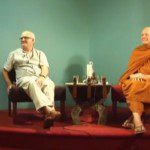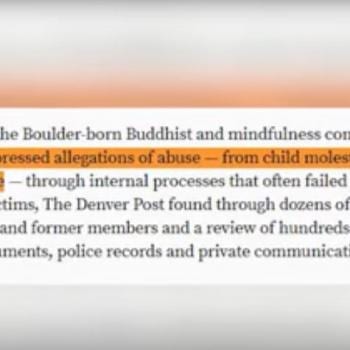It has been a busy week here, with a trip to Cheltenham to lead metta meditation for students in Dave Webster’s course on Buddhism and a journey to London to see Professor Ian Harris talk on Buddhism and Politics at Kings College. So I haven’t been able to write as detailed a post on week two of the Buddhism and Modern Psychology course as I wrote for week one.
This week’s lecture looked at “The Buddhist Prescription” – focusing on the 3rd and 4th Noble Truths and meditation in particular. As with week one, there was a good mix of Western psychology in the lecture and this time a focus on our feelings, particularly of attraction and aversion.
One bit that stood out to me (which is discussed a bit in the video below) was the coverage of a particularly negative feeling such as rage. From an evolutionary psychology point of view, rage might have been useful some time in our ancestral past, when we lived in small clans. Then, if a dispute arose, it might have been necessary to feel enraged at a slight or offence so as to show one’s strength and dissuade further aggression against you.
However, in today’s world this knee-jerk fight or flight (in this case fight) response no longer makes sense. Many of the people that might seem aggressive to us are perfect strangers and will never be seen again. Wright gives the example of road rage. When someone invades our space on the roads today, some of us react with the same rage that our ancestors might have needed to defend their territory in the past. But in today’s world, that level of reactivity no longer serves us and for those who are unable to reign in their emotions there can be disastrous consequences.
So it might be quite right, even from an evolutionary psychology perspective, that Buddhism treats such emotions suspiciously and attempts to get us to view them mindfully and without attachment. Doing thus, according to Buddhism and the experience of many Buddhists and non-Buddhists, allows you to choose how to act in a either a stressful fight or flight (anxiety is another example used) situation rather than simply reacting.
Luckily the course is still (to my knowledge) open to new students so you can view it all here, and our instructor, Robert Wright, has put up a portion of this week’s “office hours” on youtube:












